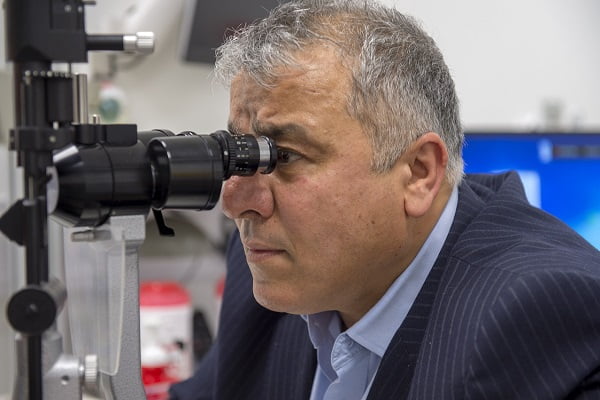Doctors Call for Regular Eye Checks in Diabetes Patients
- Updated on: Jul 24, 2024
- 4 min Read
By
- Published on Dec 6, 2018


What is a diabetic eye disease?
Diabetes may affect various parts of the eye, including the retina, macula, lens and the optic nerve. A diabetic eye disease is a group of eye conditions that can affect people who are diagnosed with diabetes.
- Diabetic retinopathy is a condition that affects blood vessels in the light-sensitive tissue referred to as the retina that lies at the back of the eye.
- Diabetic macular edema is the swelling in an area of the retina known as the macula.
All forms of diabetic eye diseases may have the potential to cause severe eyesight problems and may even lead to blindness.
Diabetic retinopathy
The primary concern for eye health in patients with diabetes is the progression of diabetic retinopathy. The retina is the light-sensitive region present at the back of the eye. As the damage gets worse, people may begin to lose their vision. As a result, several eyesight problems may arise including blurry vision, less intense image formation, and even complete loss of the vision. This condition can affect people with both type 1 and type 2 diabetes. The longer you live with diabetes, the more likely you are prone to diabetic retinopathy. This is why doctors suggest adopting a healthy lifestyle and having knowledge about managing diabetes is essential.
More: Blood sugar chart you’ll need all the time in diabetes
More: Anti–Vascular Endothelial Growth Factor Therapy (Anti VEGF Therapy) for Eye Disorders
How does it feel to have diabetic retinopathy?
According to a study, it was found that diabetic retinopathy, a complication of diabetes, is the leading cause of blindness in adults in the United States. When asked about their vision from patients associated with diabetes, many claimed that unchecked high blood pressure caused bleeding in the back of their eyeball and their eyesight deteriorated very badly. Many people said that they were healthy in the past and the blood pressure was in control but later they came to know that their eyesight became weak because of type 2 diabetes.
Another patient added that she noticed the sudden appearance of a bulge in her right eye. It looked like a water bubble, but that blob disappeared after a couple of days. Later, she realized something was terribly wrong with her vision, as she was not able to see clearly.
It was found that people diagnosed with type 1 diabetes had carefully managed their disease in some studies. That includes receiving regular complete dilated eye checkup to detect early signs of diabetic eye disease, a group of conditions that includes diabetic retinopathy, cataract, and glaucoma.
The National Eye Institute recommends that people with diabetes should get a dilated eye checkup at least once a year to detect early signs of diabetic eye disease.
Diabetic Retinopathy, a growing threat to our vision
More than 25 million Americans have diabetes, and the number is considerably increasing. People with diabetes are at risk for diabetic eye diseases and risk for losing vision. Diabetic retinopathy creates a greater risk to the vision. It is the most common cause of eyesight loss among people with diabetes and the most common cause of blindness among working-age Americans. Eventually, high blood sugar levels from diabetes affect the tiny blood vessels of the retina.
Researchers and doctors emphasize to control diabetes
According to Emily Y. Chew, M.D., National Eye Institute, “Well-controlled blood sugar level has a positive, measurable, and lasting effect on eye health,” In an ongoing research, she and her team established that less diabetic retinopathy progression occurs among people with type 2 diabetes who slavishly controlled their blood sugar levels. This study is delivering a powerful message to people associated with type 2 diabetes. This can be a vital preventive measure to people with type 1 diabetes as well.
The National Eye Health Education Program (NHEP) recommends the following important steps to diabetic patients to keep their health on TRACK:
- Take the medications as prescribed by the healthcare professional
- Reach and maintain your healthy weight
- Add physical activity to your daily routine
- Control your ABC’s: A1C, blood pressure and cholesterol levels by adopting a healthy lifestyle
- Kick the smoking habit
Eye exam for people with diabetic retinopathy
Health care professionals recommend that people, who have diabetes, make sure to get a regular eye examination. In addition, early detection may protect your vision because of timely treatment. People with diabetes need to have a complete eye checkup every year by an ophthalmologist or optometrists who are specialists about eye problems in people with diabetes.
Ophthalmologist or eye specialists may put drops in the eyes to examine the retina. This is known a dilated eye exam. These eye drops may make the pupils eyes bigger. Then the doctor can see the back of your eye and find if any eye problems exist.
When do you need an eye checkup?
Eye examination depends on the type of diabetes you are associated with:
- Adults with Type 1 Diabetes: It is advised to have a dilated eye checkup within five years of being diagnosed and every year after that.
- Adults with Type 2 Diabetes: Doctors recommend that people should have a dilated eye exam soon after the diagnosis of diabetes. About 1 in 5 people with type 2 diabetes have some eye problems when they are diagnosed with diabetes.
Following the foremost eye exam, it is recommended for people with diabetes to have a dilated eye exam every year, although your doctor may suggest it every 2 or 3 years after a normal exam depending on your eye condition.












